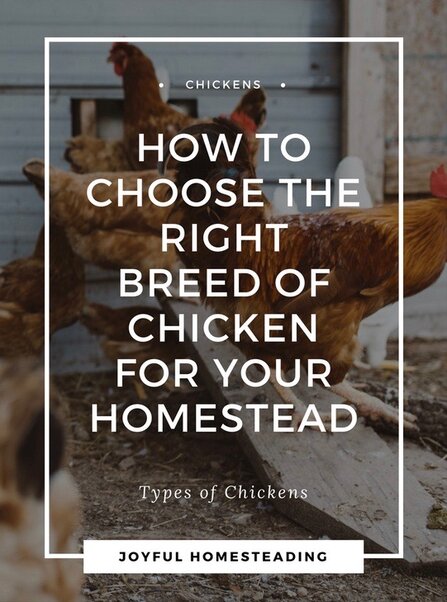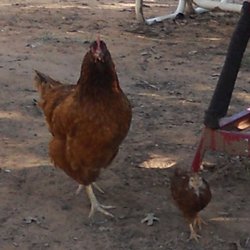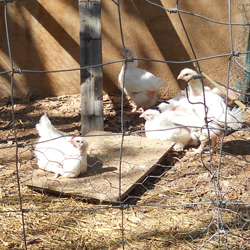Types of Chickens
Different types of chickens can provide different great benefits for the
self-reliant homesteader, depending on what you are more interested in:
meat or eggs. Knowing what you need before you order will save you
time and frustration, so here is a little information about some of the
more beneficial breeds.

Please note that I have certainly not listed all the breeds of chickens available. That would take more space than I care to take up on this page. Simply put, there are dozens of different types of chickens out there, but these are some of the most common and popular breeds available from most hatcheries.
Types of Chickens and
The Sturdy Rhode Island Red

This is by far my favorite breed of chicken and the ones I have the most experience with.
They are one of the dual-purpose breeds, which means they are bred to produce both extra meat and more eggs, which means they aren't a star at either.
But they do produce plenty of eggs, especially if you add cayenne pepper into their feed in the winter and give them sprouts year round.
Expect them to stop laying around December, as with most layers, although I have heard of people providing extra lights in the winter time to urge more eggs out of their poor chickens. I figure my girls need a rest, so I leave them alone. It's up to you.
These chickens do well both in the winter and during the hot southern summers where I live. True, they look a little sluggish in the heat, but then again, who doesn't?
The downside of Rhode Island Reds is they can be aggressive. My kids were afraid of them and refused to collect their eggs. Also, despite what the hatcheries may tell you, they are really, truly, not good for meat birds; too much work for not enough meat. Instead, invest in one of the Cornish Rock breeds for meat for your freezer. But overall, the Rhode Island Reds are an excellent breed for homesteaders.
Buff Orpingtons
These are a gentler breed and better if you want your children to help with the chores. I had a Buff Orpington once, and my aggressive Rhode Island Reds had her in place in no time. Again, they are good for eggs, and not great for meat, but still a good backyard chicken.
Ameraucana
If you want a pet as well as an egg producer, the Ameraucana is the way to go. I personally have never befriended a chicken, but I also have children, a job, dogs, cats and not a lot of free time. If I were retired and an empty nester, things might be different.
Ameraucanas lay green eggs, which is fun and could be a plus if you're planning on selling your extra eggs. They're pretty and obviously not from any store. City slickers love them.
Leghorn Chickens
One of the best types of chickens for eggs is, hands down, the Leghorn breed. The egg industry uses this breed for their superior laying ability, which should tell you something. They also tend to lay at least a month longer than other breeds.
Their eggs are white, which has absolutely no impact on their taste whatsoever, but I still prefer the brown or green eggs. That way you know you're eating eggs from a local bird. Otherwise, it really doesn't matter.
Cornish Rocks

These birds grow so fast, it's scary. And they produce so much meat that they have trouble walking by the time they are six weeks old.
You absolutely have to butcher them by the time they reach ten weeks of age, or they'll die of a heart attack - just too much weight for one little chicken.
You really notice the difference if you order Cornish Rock chicks and
one of the other, tamer breeds at the same time and keep them in the same brooder. The Cornish Rocks are all over the feeder and gobble up the feed. You have to watch out for the other breeds to make sure they're eating enough, especially in the early days. Not so, with the Cornish Rock.
Because they eat so much and grow so fast, you really should add wheat sprouts to their feed daily. They'll grow more meat and less fat that way, and they'll stay far more active even at the end of their short little lives. Just give them chick feed, and they sit all day long. Give them sprouts, and they'll act - and smell - more like normal chickens.
But no matter what types of chickens you prefer, you'll find they are fun to raise, and their fresh meat and eggs will provide your homestead with a self-reliant food that is healthier and tastier.
Related read: Live in the city? It's still possible to keep chickens. Here's how.
Learn More About Raising Chickens
What Other Visitors Have Said
Click below to see contributions from other visitors to this page...
Have Any Comments? 




Post them here, and thanks for sharing.
Have Any Comments? Not rated yet
Post them here, and thanks for sharing.










New! Comments
Have your say about what you just read! Leave me a comment in the box below.